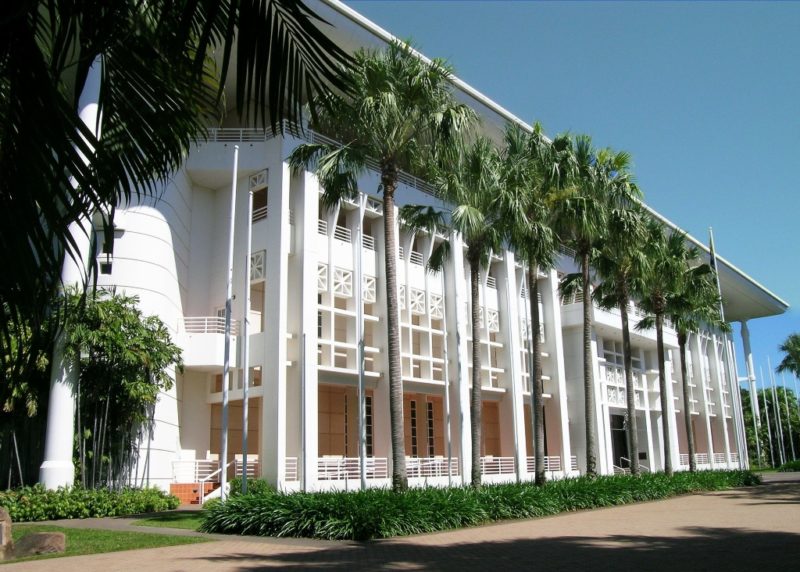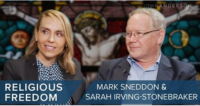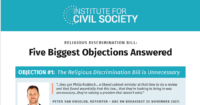In September 2017, the Northern Territory’s Department of the Attorney General and Justice released a Discussion Paper about the “Modernisation of the Anti-Discrimination Act“. They called for comments on the paper. The Institute for Civil Society made the following submission in January 2018. A PDF of the paper can be found here.
Comment on NT DAGJ Discussion Paper: Modernisation of the Anti-Discrimination Act”
31 January 2017
Key Points
1. The Institute for Civil Society submits that the proposals in the Discussion Paper fail to understand and promote the essential role of exemptions or balancing provisions in antidiscrimination law. The exemptions and balancing provisions are essential to make the core value of antidiscrimination law (like treatment of like cases) workable in a diverse and multicultural society and to uphold all human rights, not just the right to non-discrimination. They should not be treated as suspect derogations from an ideal of equality. As the list of protected attributes grows so does the potential for conflict with other values and communities in society and balancing provisions or exemptions are essential to give space for all groups and individuals to maintain and express their identity and human rights.
The proposed inclusion of new protected attributes in the Discussion Paper (such as lawful sexual activity, gender identity and intersex status) proceeds from a particular worldview and social vision of gender and relationships. It increases the scope for conflicts with those groups who hold to more traditional values and social visions of gender and relationships (including minority religious, indigenous and ethnic communities). If those new attributes are to be included, there is good reason to consider how to strengthen the exemptions or balancing provisions to protect the human rights of those communities and individuals who hold to and express and model in their communities those traditional values and social visions.
Instead the Discussion Paper calls for the removal of exemptions related to religious bodies and schools and accommodation and access to religious sites (but without explanation leaving the protection for aboriginal sacred sites under separate legislation) because these exemptions are said to “enshrine discrimination”. In fact, these exemptions or balancing provisions uphold the fundamental human rights to freedom of association, freedom of religion, conscience and belief and cultural rights and the right of parents to give their child a moral and religious education according to their convictions. To remove these exemptions or balancing provisions will cause the Northern Territory to contravene Australia’s international obligations to uphold those human rights. The Institute for Civil Society opposes the removal of those balancing provisions or exemptions and calls for them to be strengthened if the new protected attributes are to be added.
2. The Territory has a real opportunity to modernise anti-discrimination law into a more holistic human rights framework which defines discrimination in a way which acknowledges that the non-discrimination right must be balanced with all other human rights. In this framework, all the rights in the International Covenant on Civil and Political Rights are balanced rather than Article 26 (non-discrimination right) being privileged above all others and the other rights (such as freedoms of conscience and religion, association and speech in Articles 18, 19 and 22) being preserved only to the extent they are found in “exemptions” to the non-discrimination right. Accordingly, discrimination should be redefined to not include distinctions which are reasonably capable of being considered appropriate and adapted to achieve a legitimate objective including the protection, advancement or exercise of another human right protected by the International Covenant on Civil and Political Rights. Such an approach reflects the view of the UN Human Rights Committee that “not every differentiation of treatment will constitute discrimination [e.g. for the purposes of article 27], if the criteria for such differentiation are reasonable and objective and if the aim is to achieve a purpose which is legitimate under the Covenant.” The approach is similar to that in s.153 of the Fair Work Act 2009 (Cth).[i]
3. The Discussion Paper notes that the Territory does not have a law that makes public incitement to acts of racial hatred either an unlawful act or a criminal offence or both (the Federal Racial Discrimination Act operates in the Territory to do this in any event). But the Discussion Paper does not propose a law about inciting racial hatred. Instead it proposes an anti-vilification provision which is very broadly drafted to prohibit any conduct that “insults or offends” a person or groups of persons on the basis of race, disability, sexual orientation, religious belief, gender identity or intersex status. The proposal is so broadly drafted that it represents a major limitation on freedom of expression. The Territory government should take note of the many criticisms of Tasmania’s controversial, overbroad anti-vilifications provisions and of the need to wind back Victoria’s religious vilification law because it promoted religious intolerance rather than tolerance.[ii] If the Territory government were to proceed with anti-vilification legislation it should restrict the prohibited conduct to that which incites hatred for, or threatens violence against, persons or groups of persons. And it should only do so on the basis of sound evidence that a real problem exists and that a provision of this type will solve it. There is no such evidence in the Discussion Paper.
The Institute for Civil Society recommends:
- Not removing section 30(2) of the Anti-Discrimination Act.
- Not removing section 37A of the Anti-Discrimination Act.
- Not removing section 40(2A) of the Anti-Discrimination Act.
- Not removing section 40(3) of the Anti-Discrimination Act.
- Not removing section 43 of the Anti-Discrimination Act.
- Ensuring that any anti-vilification provisions will be balanced with freedoms of expression and speech.
- Not including the phrase “offend, insult, humiliate or intimidate another person or a group of people,” or similar, in any anti-vilification provision.
- Including the phrase “to make it unlawful for a person to do an act, other than in private (for example at home), if the act is reasonably likely, in all the circumstances, to: (1) incite hatred or; (2) threaten violence,” in any anti-vilification provision.
Detailed Comments on Human Rights Problems with the Discussion Paper
The Discussion Paper on modernising the Anti-Discrimination Act (the Act) addresses a number of areas. We will specifically address “Question 14: Should any exemptions for religious or cultural bodies be removed?”.[i] We will also briefly address “Question 4: Should vilification provisions be included in the Act? Should vilification be prohibited for attributes other than on the basis of race, such as disability, sexual orientation, religious belief, gender identity or intersex status?”[ii]
The Discussion Paper suggested the Act “could be amended to remove current exemptions for religious bodies in the areas of religious educational institutions, accommodation … and access to religious sites.”[iii] Specific sections of the Act that were mentioned include:
- Section 30(2), regarding the ability for religious education institutions to exclude people from enrolment on the grounds of religious belief and practice.
- Section 37A, regarding the ability for religious education institutions to discriminate against persons in relation to employment at the institution on the grounds of religious belief and practice, and sexuality.[iv]
- Section 40(2A), regarding the ability for religious education institutions to discriminate against persons in relation to provision of accommodation on the grounds of religious belief and practice.
- Section 40(3), regarding the ability for religious bodies to discriminate against persons in relation to providing accommodation at facilities under their control, on the grounds that not doing so would contravene their doctrine and offend “the religious sensitivities of people of the religion.”[v]
- Section 43, regarding restricting access to land, a building or place of cultural or religious significance based on sex, age, race or religion if not doing so would contravene their doctrine and offend “the religious sensitivities of people of the culture or religion.”
We are concerned that the Discussion Paper misconceives the role and importance of exemptions under the amendments suggested in the Discussion Paper, and that they will severely limit some fundamental rights of Territorians. Specifically, we foresee that amending the Act in the ways suggested would limit:
I. The right of parents to ensure their children have religious and moral education in accordance with their convictions.
II. The right to freedom of association and freedom of expression through voluntary associations, and cultural rights.
III. The right to freedom of religion and belief.
We also (IV) consider that the suggested amendments would, themselves, result in the discrimination against religious organisations and individuals.
Finally (V) we address the potential inclusion of anti-vilification provisions in the Act.
We will address each of these matters in turn.
I. The right of parents to ensure their children have religious and moral education in accordance with their convictions.
The International Covenant on Civil and Political Rights (ICCPR) article 18(4) obliges Australia to have respect for the liberty of parents and, when applicable, legal guardians to ensure the religious and moral education of their children in conformity with their own convictions.
ICCPR Article 26 contains a protection against discrimination, but that must be read subject to the other rights in the ICCPR including article 18(4).
The UN Declaration on the Elimination of All Forms of Intolerance and of Discrimination Based on Religion or Belief article 5(2) provides that: “Every child shall enjoy the right to have access to education in the matter of religion or belief in accordance with the wishes of his or her parents.”
The amendments suggested in the Discussion Paper will limit this right which Australia has an international obligation to uphold under the ICCPR and UN Declaration.
The current exemptions protect a religious school from being forced to accept the promotion of views and examples of conduct by staff or members or students which are opposed to its religious values and ethos. The effect of the suggested amendments is that religious schools will be forced to employ persons whose beliefs or actions and lifestyles in relevant respects do not conform to the doctrines and practices of that religion if the State does not agree that such conformity is necessary. They will also be forced to enrol students who do not conform in a similar way. Their only recourse will be to apply for an exemption through the Attorney-General’s Department.
This will limit the ability of those schools to ensure that staff are ambassadors for and models of the values of the religion. If religious schools are forced to employ staff who contradict the values of the religion by word or example, that will limit the ability of religious schools to provide a religious and moral education in accordance with the convictions of parents who voluntarily choose the value system of that school, contrary to the ICCPR and UN Declaration provisions cited above.
The suggested amendments to the Act will encroach upon the right for parents to give their children a holistic education in accordance with their moral and religious convictions. This is especially apparent when considering that education is not simply passing on facts, but is also about character formation. Harrison and Parkinson have pointed out that religious associations (and schools) call on all their members (and students) to (for example) “be a Catholic” or “be a Muslim” and this goes beyond doctrinal propositions to include a holistic set of behaviours and attitudes for virtuous living including sexual behaviours and attitudes.[vi] Patrick Lenta also writes that “moral virtue is not simply taught, but is acquired by pupils through their association with teachers who are themselves virtuous, with the corollary that it is wrong to place pupils with teachers who are not virtuous … teachers teach moral values not didactically, as in the case of arithmetic, but through example”.[vii]
II. The right to freedom of association and freedom of expression through voluntary associations, and cultural rights.
One purpose of the current exemptions is to allow the religious body or school the freedom to express its beliefs and values both in teaching and in living them out in the shared life of its community of members and employees and to maintain the integrity of its expressed values and ethos. As Parkinson has stated: “modelling [the religion] within a faith community is as important as teaching [the religion] within a classroom or from a pulpit. Indeed it may well be more important and have more impact on people’s lives.”[viii]
The current exemptions protect the religious body or school from being forced to accept the promotion of views and examples of conduct by staff or members or students which are opposed to its religious values and ethos. These freedoms are not peculiar to religious bodies. They provide a freedom of internal management and ability to maintain fidelity to the expressed values and mission of the association which our society would value for any voluntary association formed to express and model a set of values whether cultural, ethnic, political or religious. Our society would not expect the ALP or the Liberal Party or the Greens (also voluntary associations) to have to employ and retain persons who consistently spoke or acted against core party policy. So why would a law force a Muslim school to justify to an arm of the state why it should not have to hire a Jewish maths teacher or vice versa?
In the USA, the Supreme Court has held that the First Amendment rights to free speech and assembly (association) and to petition include a constitutional freedom of people to gather in voluntary associations to express ideas – a right of expressive association. This is not based on the freedom of religion clause of the First Amendment but applies to all expressive associations, whether religious or not. The Supreme Court has held that the right of expressive association can override non-discrimination laws and government policies if the effect of non-discrimination laws or policies would be to force associations to include persons (as employees or members) and that would interfere with the ability of the association to consistently express its values.[ix]
The ICCPR protects freedom of expression (Article 19) and freedom of association (Article 22). Implicit in these rights is the freedom of members of a voluntary association not to be forced to join with or accept as other members or employees of voluntary associations those whose views and practices are antithetical to the values of the voluntary association.
Article 22 of the ICCPR also contains elements of this freedom. It states “In those States in which ethnic, religious or linguistic minorities exist, persons belonging to such minorities shall not be denied the right, in community with the other members of their group, to enjoy their own culture, to profess and practise their own religion, or to use their own language.” Being forced by law to accept within a religious body or school persons who do not accept and practice the religion and who speak and act inconsistently with the religion is a limitation on the right of persons in community with others of the same religious background to declare and practice that religion.
Indeed, as we have argued elsewhere, freedom of association is itself a “vehicle” of other fundamental human rights; including freedom of conscience, freedom of speech, and freedom of religion and belief.[x]
III. The right to freedom of religion and belief.
Religious freedom of individuals and bodies is well established in international human rights law. Article 18 of the ICCPR includes the following provisions:
1. Everyone shall have the right to freedom of thought, conscience and religion. This right shall include freedom to have or to adopt a religion or belief of his choice, and freedom, either individually or in community with others and in public or private, to manifest his religion or belief in worship, observance, practice and teaching.
2. No one shall be subject to coercion which would impair his freedom to have or to adopt a religion or belief of his choice.
3. Freedom to manifest one’s religion or beliefs may be subject only to such limitations as are prescribed by law and are necessary to protect public safety, order, health, or morals or the fundamental rights and freedoms of others.
The amendments suggested in the Discussion Paper would contravene Article 18(1) of the ICCPR, which states that people ought to have a right “to manifest his religion or belief in worship, observance, practice and teaching.”
Under the suggested amendments, a religious body will have to apply to an arm of the State for an exemption under the Act. The State will then have to decide if the religious body is allowed the exemption. For example, a religious school might apply for an exemption under the Act in order to hire teaching or administrative staff, and the Attorney-General’s Department will have to decide if they can or cannot discriminate on the grounds of religious belief or practice (currently protected by s.37A of the Act). If the Department was to decide that the school cannot be exempted from rejecting applicants based on religious belief or practice, the freedom of a person to demonstrate his or her religion or belief in worship, observance, practice and teaching, as part of a community in that body or school (and even individually in that body or school) is impaired. The culture of the organisation is radically changed from one where the person knew that all employees upheld the person’s religion in belief and practice to one where only some do and some can freely oppose it under protection of anti-discrimination law.
Section 43 of the Act currently protects the ability for people to discriminate regarding access to land, a building or place of cultural or religious significance based on sex, age, race or religion if not doing so would contravene their doctrine and offend “the religious sensitivities of people of the culture or religion.” The suggestion to remove this section seems arbitrary, given that access to certain (and probably very limited) pockets of land, buildings or places is unlikely to have much impact on those being refused. Removing it might also disproportionately limit the right to “manifest” one’s religious belief. While restricting access to certain areas, rooms and sites might seem puzzling to many today (especially if it is based on sex, age, race or religion) it is obviously not beyond the realms of reasonableness, given that Aboriginal sacred sites will remain protected under the Northern Territory Aboriginal Sacred Sites Act. The Discussion Paper notes this, but has no proposal to remove discriminatory exemptions contained in that act.[xi]
IV. Discrimination Against Religious Persons and Organisations
Ironically, the suggested amendments to the Anti-Discrimination Act (which would remove sections 30(2), 37A, 40(2A), 40(3) and 43 of the Act) would themselves be discriminatory, and if not authorised by an Act of the Assembly would contravene section 19(1)(m) of the Act.
In international law, religious bodies and schools also have freedom of religion rights. The Attorney-General’s Department should consider whether making the suggested amendments will trespass on the rights and freedoms of these bodies, but also whether this will itself amount to a kind of “reverse discrimination.” Carolyn Evans has written:
While individuals choose to exercise their religion within an organised religious group, the state must respect the autonomy of this group with respect to decisions such as the freedom to choose their religious leader, priests and teachers, the freedom to establish seminaries or religious schools and the freedom to prepare and distribute religious texts or publications.[xii]
Currently, the Act gives similar exemptions to religious bodies[xiii] and schools, political parties[xiv], political clubs[xv] and to clubs which operate principally to preserve a minority culture,[xvi] such as clubs for ethnic groups and LGBTI people. All of those groups enjoy statutory exemptions to discriminate either in relation to employment or membership in order to preserve and protect their values, activity and culture – be it religious beliefs and activity, political beliefs and activity or their minority culture.[xvii]
So, the Act allows the Greens political party to refuse to employ climate change deniers as policy spokespersons or call centre operators or accountants or in any other position. The Act allows a gay men’s club which operates primarily to preserve gay male culture to refuse to have people other than gay men as a member without requiring any justification as to why sexual orientation should be a necessary condition of membership.
But the only exemptions targeted for removal in the Discussion Paper relate to religious bodies and groups and schools. Why not political parties and clubs? Why not clubs for minority cultures? It is not clear how removing existing exemptions relating to religious bodies can possibly be understood as increasing equality and reducing discrimination, when the same standards are not being applied to other bodies with equivalent freedoms. To remove the existing exemptions would be discriminatory in limiting the freedoms of association and expression of religious bodies and associations and persons. It would also be discriminatory against members and staff of religious bodies, and of staff and parents and students of religious schools. All the while, it would not affect those freedoms of members and staff of political organisations and clubs for promoting minority cultures.
V. Anti-vilification provisions
The Discussion Paper suggests that amendments could be made “to make it unlawful for a person to do an act, other than in private (for example at home), if the act is reasonably likely, in all the circumstances, to offend, insult, humiliate or intimidate another person or a group of people; and the act is done because of a characteristic of that person or they are a members of the group on the basis of race, disability, sexual orientation, religious belief, gender identity or intersex status.”[xviii] The Discussion Paper also suggests amendments that would include “appropriate exemptions to cover acts done “reasonably and in good faith” to allow for free and fair speech on related topics.”[xix] We have two responses to this.
First, we would recommend against including the phrase “offend, insult, humiliate or intimidate another person or a group of people.” This provision could too easily be used to stifle freedom of expression and freedom of speech. Offense, being insulted, and feeling intimidated, are all based on subjective responses of persons who are or perceive themselves to be the target of acts of expression. Requiring that such responses be reasonably likely does not alter the fact that it is the visceral and subjective responses of offence or insult reasonably likely to be experienced by the targeted person or persons which would control what expression is prohibited. That is completely different to prohibiting expression which is likely to incite violence or hatred in third parties against the targeted person or persons. All kinds of otherwise innocuous acts of expression could be construed as contrary to such a provision.
This would encourage people to turn to litigation to resolve differences of opinion, hurt feelings, offense, and various other kinds of social conflict. Our civil discourse will not benefit from such a law. Rather than encouraging civility in discourse, it will stifle healthy discussion and cause controversial opinions to be aired in an atmosphere of mutual grievance. These opinions could well be distasteful and offensive, but to squash and silence them has the potential to increase their reach and power. If something is unpleasant or untrue, it should be openly debated, not simply silenced.
The proposed provision will also move pure disagreements into the realm of lawfare. For example, the Discussion Paper proposes to add lawful sexual conduct as a protected attribute and the Act already includes sexuality (to be renamed sexual orientation) as a protected attribute. It is well known that orthodox Muslims, Jews and Christians are opposed to adultery (which is a form of lawful sexual conduct) and homosexual sex. Others think that opposition is ludicrous. The disagreement is well known and currently Australians on both sides of the disagreement agree to disagree. If the proposed anti-vilification provision is enacted and an orthodox Muslim, Jew or Christian states their objection to adultery or homosexual sex and calls it a sin or offensive to their religion, it is reasonably likely that such a statement will offend or insult people who are engaged in adultery or homosexual sex and such people could bring an anti-vilification complaint with a view to prohibiting such speech. Does the Territory really want well known disagreements about sexual moral standards being adjudicated by the Antidiscrimination Commissioner and the courts on the basis of offence and insult? How could that be conducive to civil harmony? This example shows that the effect (and perhaps the purpose) of the proposed overbroad anti-vilification provision is to use the power of the law to ban the public expression of certain views. Such an anti-democratic curtailing of the expression of certain views would take the Anti-Discrimination Act a very long way from its original intent of protecting people from being discriminated against in the provision of employment, goods, services, accommodation and the like.
If there is evidence that some provision is required to reduce actual expressions of hatred and violence to some person (and the Discussion Paper offers none), we would suggest the inclusion of a provision “to make it unlawful for a person to do an act, other than in private (for example at home), if the act is reasonably likely, in all the circumstances, to: (1) incite hatred or; (2) threaten violence.” This allows for more objectivity in assessing a real risk of harm caused by hateful and threatening speech.
Mark Sneddon
Executive Director, Institute for Civil Society
marks@i4cs.com.au
Simon Kennedy
Research Analyst, Institute for Civil Society
simonk@i4cs.com.au
__________________________________________________________________________
[i] Department of the Attorney-General and Justice, Discussion Paper: Modernisation of the Anti-Discrimination Act, September 2017, 21–22.
[ii] Discussion Paper, 12.
[iii] Discussion Paper, 22.
[iv] The Discussion Paper also raises the possibility of amending the language of “sexuality,” replacing it with “sexual orientation.” This would affect this clause. Discussion Paper, 9.
[v] Anti-Discrimination Act, NT (as at 6 Oct 2015), s. 40(3)(b)(ii).
[vi] Harrison and Parkinson, “Freedom beyond the Commons: Managing the Tension Between Faith and Equality in A Multicultural Society” (2014) 40 Monash University Law Review 413, 444.
[vii] Lenta, “Taking Diversity Seriously: Religious Associations and the Work-Related Discrimination” (2009) 126 South African Law Journal 827, 853.
[viii] Patrick Parkinson, “Christian Concerns about an Australian Charter of Rights” (2101) 15(2) Australian Journal of Human Rights 83, 97.
[ix] Boy Scouts of America v Dale (2000) 530 US 640; Hurley v Irish-American Gay Lesbian and Bisexual Group (1995) 515 US 557; See also Rumsfeld v FAIR 126 S.Ct 1297.
[x] Peter Mulherin and Simon P. Kennedy, ‘Archipelago or Landmass: Voluntary Associations, Civil Society and the Health of Liberal Democracy,’ POLICY 33, no. 2 (Winter 2017), 40–44.
[xi] Discussion Paper, 21.
[xii] Carolyn Evans, Legal Protection of Religious Freedom in Australia (2012) 35. Evans acknowledges that group religion rights like all rights are subject to limitation but such limitations need to be reasonable and justified. See also Nicholas Aroney, “Freedom of Religion as an Associational Right” (2014) 33 University of Queensland Law Journal 153 at 178ff.
[xiii] Anti-Discrimination Act, s.37A, s.51.
[xiv] Anti-Discrimination Act, s.47(1).
[xv] Anti-Discrimination Act, s.47(1).
[xvi] Anti-Discrimination Act, s.47(1)(a).
[xvii] The exemption relating to employment is covered by s.35(1)(b)(i) of the Act, which states that discrimination is lawful if based “on a genuine occupational qualification.”
[xviii] Discussion Paper, 11.
[xix] Discussion Paper, 11.
[i] This recommendation is based on the work of Professors Parkinson and Aroney – see Patrick Parkinson and Nicholas Aroney, Submission to Attorney-General’s Department, Consolidation of Commonwealth Anti-Discrimination Laws, January 2012.
[ii] See the controversy surrounding the case of Catch the Fire Ministries Inc v Islamic Council of Victoria and the subsequent amendment of the Victorian Racial and Religious Tolerance Act by the government to expressly allow proselytising.








Recent Comments